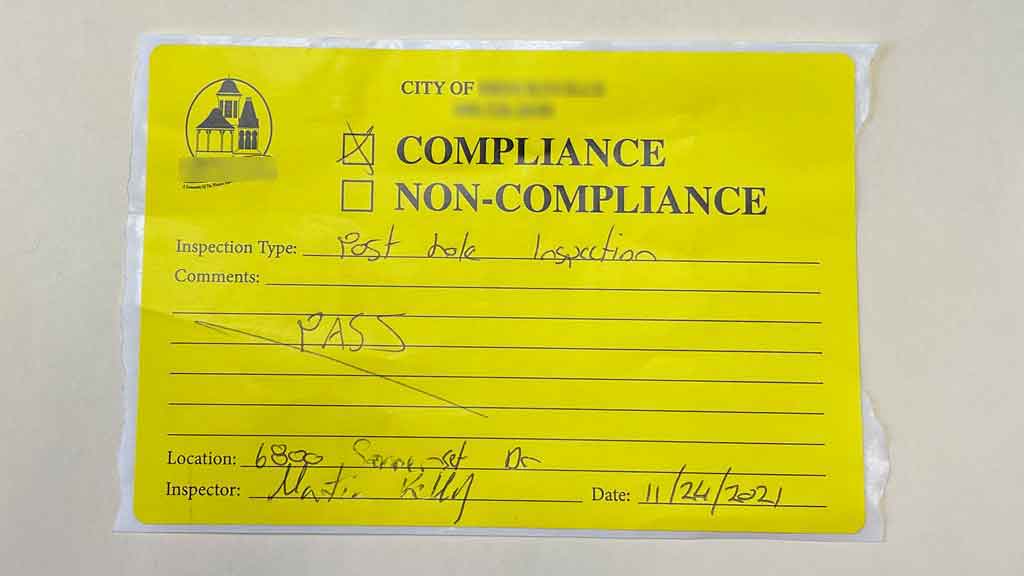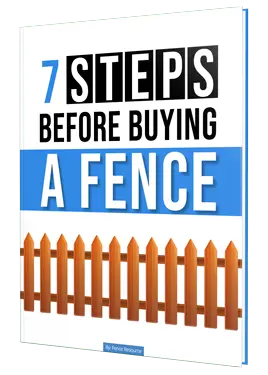There are many types of fence inspections. The most popular types are post hole depth, fence placement, pool fence inspections, finial inspections and sometimes HOA inspections.
While fence inspections may seem like an uanessacry step in the fence installation process, they are actually a good thing for the consumer. Ensuring contractors meet certain building standards.
As a result, the customer can rest assured that the contractor has not cut corners. Furthermore, that the fence is up to code and complies with all building an or zoning requirements.
In some cases, the inspections cover safety standards in regards to swimming pools. As well as home owners associations and their limitations on particular fence styles and heights.
So in this article, we’ll take a look at the most common types of inspections. Explaining the reasoning for each one.
Fence Post Hole Depth Inspections

The most common fence inspections are post hole depth inspections. As you may have guessed, these inspection measure the depth of each fence post hole.
Usually your city, township or county will require the depth of each hole to meet certain criteria. Many times the height of the fence determines the hole depth. It is common to have post hole depths specified at 50% of the above ground height of the fence.
The region where the fence installation takes place also has bearing on post hole depth. Geographically, soil composition changes by region. Furthermore, the frost line depth also comes into play.
Therefore, post hole depth in one region may have a different depth requirement for the same fence in another. When filing for your fence permit, most applications list post hole depths when applicable.
Each building department handles scheduling inspections differently. Some building departments schedule inspections 24 – 48 hours in advance. Others wait until the holes are dug.
An inspector comes to the job site in order to check the depths of the holes. Some will measure every hole to the exact inch. While others will visually look at a few holes and be on their way.
DIYers will have to schedule their own inspections. Professional fence contractors will make their own appointments.
The Purpose of Post Hole Inspections
The purpose is obvious. The city, township or county wants to make sure the fence posts are installed correctly. As a result, ensuring you recieve a properly installed fence. One that won’t have posts leaning or heaving after a couple of years.
Most fence companies (including myself) don’t like post hole inspections. They slow down production. Sometimes requiring an extra trip altogether. However, as a reputable contractor, the rules are the rules and we must obey them.
Fence Placement Inspections
Fence placement inspections are the second most common type. These inspections confirm installation of the fence matches the permit application.
Some building departments require a professional pin survey before granting approval. An inspector confirms fence placement. Inspecting the day the posts go in. Checking to make sure the posts are inside of the property lines.
However, other cities require staking the fence lines out with string line before starting. Again, an inspector reviews the location before granting approval of the fence permit.
Contractors don’t like the inspections that require staking out. It adds another trip to the site. Extra expense for materials and time. Not to mention, if installed too early, homeowners remove the stakes to cut the grass.
However, like a mentioned before, a reputable contractor follows the rules. So we must comply. This type of inspection is becoming more popular in recent years. I’ll explain why below.
The Purpose for Fence Placement Inspections
Once there was a time when people followed the rules. They did what they said they were going to do. Their word was enough. Unfortunately, those days are over. Now, everyone thinks the rules don’t apply and they deserve special treatment.
Heres where I’m going with this. Fence contractors and homeowners apply for fence permits and include drawings exactly how the building department requires them. However, once approved, they don’t always stick to the drawings.
This happens a lot when there are setbacks, easements, and height restrictions in side yards. Because of these restrictions, customers can’t always get what they want.
Therefore, sometimes loosing valuable yard space or having to purchase fence of a different height than they want. Over the years, homeowners and contractors have gambled. Knowingly installing fences that did not meet code.
As a result, building departments are following up more. Preventing incorrect fence installations not meeting building or zoning codes.
Pool Fence Inspections
Pool fence inspections are all about safety. Most of the safety concerns are concerning small children gaining unsupervised access to pools.
There are many items pool fence inspections cover. Spacing between vertical uprights is one. Requiring spacing of 4″ or less. Gates must self close and self latch. Latches have minimum height restrictions. The distance between horizontal rails should make it difficult for climbing, etc.
Pool fence inspections for commercial properties such as apartment complexes and community swimming pools have more codes than residential pools. However, it is best to check with local and county building and zoning departments about pool codes and rules that may apply.
This article is for general purposes and in no way is an end all be all regarding pool codes. As mentioned before, check with both county and local building and zoning departments for a list of your pool fence rules and regulations.
The Purpose for Pool Fence Inspections
Safety! That’s it. It’s all about safety. Pool fence inspections make sure the fence is safe enough to prevent accidents from happening. Specifically accidents regarding children.
The minimum spacing requirements, the self closing self latching gates and horizontal rail spacing requirements are all designed to prevent unattended children from gaining access to the pool.
Most customers understand this and willingly comply. However, not all cities and townships require pool fences. But that doesn’t mean you still don’t need one.
Your homeowners insurance company may require fences for in ground pools even if your local building codes don’t. It is a good idea to check when having a pool installed.
Final Fence Inspections
Final fence inspections come once fences complete. Just like fence placement inspections, the inspector comes to the job site. They confirm the finished fence complies with the fence permit.
Final fence inspections cover the same criteria fence placement inspections do. They confirm that the fence is within the property lines. With the correct setbacks and out of easements.
However, placement isn’t the only thing they check. They make sure the finished height of the fence is not taller than permitted. They check to make sure the good side of the fence faces the right direction.
Sometimes, they check the functionality of the gates and latches to make sure they are working properly. Basically, the inspectors do a once over of the fence. Looking for anything obvious that would give an indication to poor installation.
The Purpose of Final Inspections
The final inspection has two purposes. First is to make sure the fence is installed as specified during the permit application process.
The second is to protect you, the customer, from shady fence contractors. Final inspections keep contractors honest. Knowing the finished product must meet a minimum standard.
HOA Fence Inspections
Sometimes your HOA will also include a final fence inspection. Home Owners Association guidelines and bylaws are stricter than most cities and townships.
Therefore, even when a fence is approved by the building department, your HOA may not approve. Make sure to check with them first. You may also need an approval letter from them before obtaining a city permit.
When you purchase a home governed by an HOA, you agree to the terms and regulations. So your fence must comply. I have seen more incorrectly installed fences removed under the influence of HOA’s than by cities.
Do I Need a Fence Inspection?
So now that you know everything to know about fence inspections, you’re probably wondering if you need one. Only your local building or zoning department will have the answer.
Most permit applications state if an inspection is required and which type. However, always ask to make sure. Especially when building a fence on your own.
If you hired a professional fence contractor, they will know. A reputable contractor will know what type of inspection is required for every city they work in. Furthermore, they know when to schedule them and the criteria that must be met.

